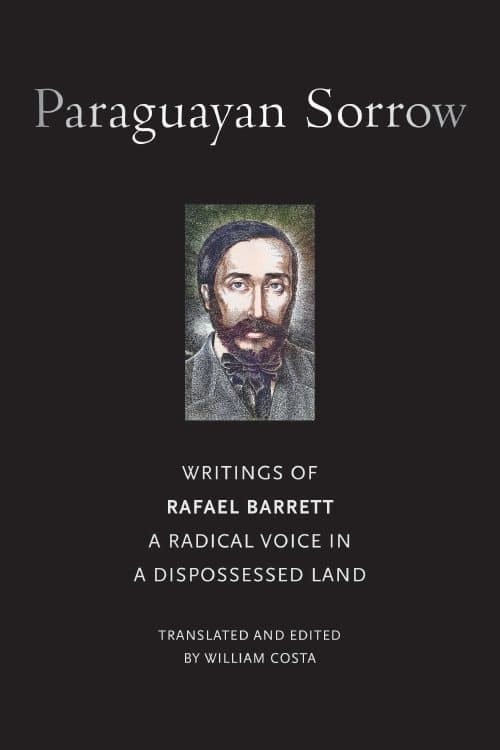By William Costa, translator of the recently released book, Paraguayan Sorrow, for The Guardian
When the Spanish anarchist writer Rafael Barrett was smuggled back into Paraguay near the small town of Yabebyry in 1909, he was unrecognisable as the young newspaper correspondent who had arrived in the troubled nation five years earlier to cover an armed revolution.
Physically, he was being consumed by a tuberculosis infection that would kill him the following year. Ideologically, he had been transformed by immersion in what he called “Paraguayan sorrow”, shedding the remnants of his youth in Madrid’s bourgeois elite to embrace anarchism and the labour movement.
Writing in the Paraguayan press, Barrett became the foremost voice denouncing the terrible conditions and state violence still ravaging the population decades after the apocalyptic War of the Triple Alliance (1864-70), which had seen half the populace killed and foreign imperialist interests take hold.
However, his metamorphosis came at a price.
“He came here because his writing and actions angered the Paraguayan government – he was persecuted,” said Alfredo Esquivel Romero, a schoolteacher in Yabebyry, where Barrett hid for a year on an isolated ranch after being deported. “He stuck to his principles, writing about the reality of what Paraguayans were experiencing.”
The exclusion and censorship continued after his death. While Barrett was praised by behemoths of Latin American literature, such as Jorge Luis Borges, Eduardo Galeano and Augusto Roa Bastos, his work spent decades in relative obscurity in turbulent 20th-century Paraguay.
Now, he is experiencing an overdue resurgence among those pushing for change in a country still battling deep social ills.
“Before, very few people in Yabebyry knew who he was,” said Esquivel Romero, whose school is participating in the Rafael Barrett Route, a project by the education ministry to promote Barrett’s texts. “We’ve done murals and reading competitions, and Barrett is becoming better known in our community.”
Adverse political conditions, including the 35-year, rightwing dictatorship of Gen Alfredo Stroessner (1954-89), meant that Barrett’s fame was long limited to persecuted leftist circles. The first Paraguayan edition of his collected articles was only released in 1988.
Following in his internationalist footsteps, many of his descendants became key figures in leftist movements across Latin America, including his granddaughter Soledad Barrett, who was murdered by Brazil’s military regime in 1973.
Today, Rafael Barrett’s growing prominence includes an increase in academic publications in recent years, a documentary and the first English-language edition of his work.
“There’s an explosion of literature addressing social issues: the lack of work and opportunities, migration, exploitation, environmental problems,” said Norma Flores Allende, a a young Salvadoran writer living in Paraguay. “Many of us writers are looking for answers – a ray of light – and that’s what we find in Barrett.”
Despite economic growth, Paraguay has one of the world’s highest levels of organised crime and great inequality, especially affecting Indigenous and campesino communities. Under the rightwing Colorado party, which has governed the country almost uninterrupted for nearly 80 years, corruption perception levels are the second highest in South America while public spending on health and education is among the continent’s lowest.
“A few things have changed, but many have continued since Barrett’s day – he feels very contemporary and relevant,” said Flores Allende.
His continued relevance is seen in his most celebrated work: The Truth of the Yerba Mate Forests. The 1908 series of articles helped expose the “slavery, torture, and murder” inflicted on bonded workers by international companies that extracted yerba mate.
Luis Rojas, an economist at research group Heñói, said Paraguay’s economy continues to be based on extracting commodities for international markets, leaving small benefits for most Paraguayans.
“Today it’s done with soy, GM corn, wheat, rice, eucalyptus plantations, ranching: it’s the same model in essence,” said Rojas. “The population is exploited, marginalised, expelled from rural areas and excluded from access to land.
“Barrett’s work is fundamental for understanding what’s happened in Paraguay over the last century – all narrated in outstanding style,” said Rojas.
In Yabebyry, where Barrett has gone from clandestine fugitive to a symbol of pride, hopes are high that his writing can also help lead to a new future.
“Rafael Barrett planted a seed here,” said Esquivel Romero. “I’m convinced that through these efforts we’ll see our young people being more prominent, defending themselves, and defending the rights of the community and its people.”

Comments are closed.